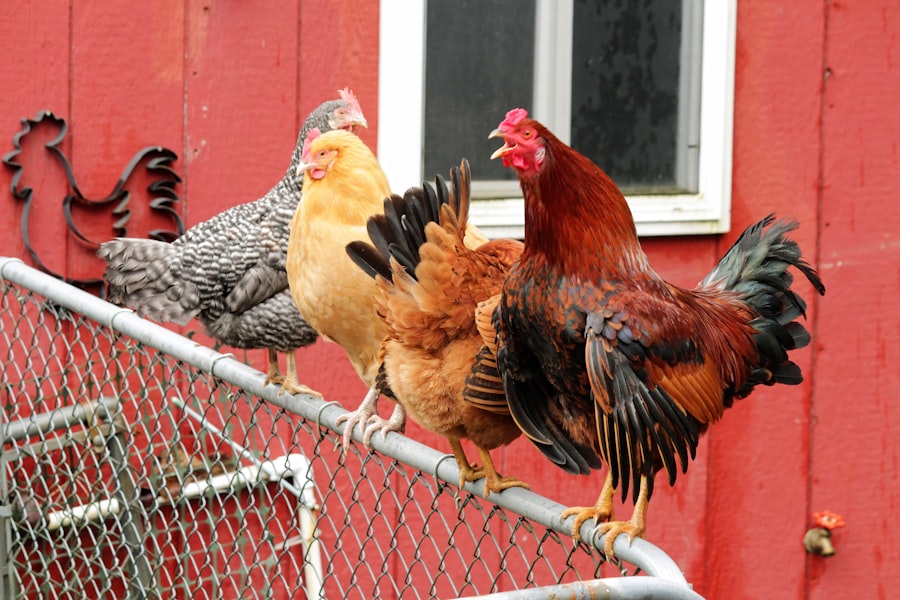Keeping chickens in your garden is a fun and rewarding hobby that can provide you with fresh eggs and a sense of satisfaction. Not only do chickens produce delicious eggs, but they also help control pests, provide natural fertilizer for your garden, and can even be great companions. In this blog post, we’ll cover everything you need to know about keeping chickens in your garden, from understanding the legal requirements to building a chicken coop and maintaining a clean and healthy environment for your feathered friends.
Key Takeaways
- Keeping chickens in your garden can be a fun and rewarding experience.
- It is important to understand the legal requirements and zoning laws for keeping chickens in your area.
- Before building a chicken coop, make sure your property is suitable and choose the right coop for your needs.
- Proper ventilation and lighting are crucial for maintaining a healthy chicken coop.
- Regular cleaning and maintenance can help prevent odor and noise complaints from neighbors.
Understanding the legal requirements for keeping chickens
Before you start keeping chickens, it’s important to understand the legal requirements in your area. Check with your local government to find out if there are any restrictions or permits required. Some areas may have limits on the number of chickens you can keep or require specific setbacks from property lines or neighboring houses. It’s also important to check if there are any noise or odor regulations that you need to adhere to.
Finding out if your property is suitable for a chicken coop
Not all properties are suitable for keeping chickens, so it’s important to assess your space before you start. Consider factors like the size of your garden, the amount of sunlight it receives, and the proximity to your neighbors. Chickens need a certain amount of space to roam and forage, so make sure you have enough room for them to move around comfortably. Additionally, chickens need access to sunlight for their health and well-being, so make sure your garden receives enough natural light.
Choosing the right chicken coop for your garden
There are many different types of chicken coops available, so it’s important to choose one that suits your needs. Consider factors like the size of your flock, the climate in your area, and your budget. If you have a small flock, a smaller coop may be sufficient, but if you plan on expanding in the future, it’s a good idea to choose a larger coop. Additionally, consider the climate in your area – if you live in a cold climate, you may need a coop with insulation or heating options. Finally, set a budget for your chicken coop and stick to it. Coops can range in price from affordable to quite expensive, so make sure you choose one that fits within your budget.
Building a chicken coop: A step-by-step guide
If you’re handy with tools, you may want to consider building your own chicken coop. Building your own coop allows you to customize it to your specific needs and can be a fun and rewarding project. Here is a step-by-step guide to help you get started:
1. Plan and design your coop: Determine the size and layout of your coop based on the number of chickens you plan to keep. Consider factors like ventilation, lighting, and nesting boxes.
2. Gather materials: Purchase or gather all the necessary materials for your coop, including lumber, wire mesh, roofing materials, and hardware.
3. Build the frame: Start by building the frame of your coop using the lumber. Make sure it is sturdy and secure.
4. Add walls and roof: Attach walls and a roof to the frame using nails or screws. Make sure everything is properly sealed to keep out predators and weather elements.
5. Install doors and windows: Cut openings for doors and windows and install them securely. This will allow for easy access to the coop for cleaning and maintenance.
6. Add nesting boxes and perches: Install nesting boxes for your chickens to lay their eggs in and perches for them to roost on at night.
7. Install ventilation and lighting: Ensure that your coop has proper ventilation to prevent moisture buildup and add lighting fixtures to provide adequate light for your chickens.
8. Add bedding and accessories: Line the floor of the coop with bedding material such as straw or wood shavings. Add feeders and waterers for your chickens to access food and water.
9. Secure the coop: Make sure your coop is secure from predators by adding wire mesh or fencing around the perimeter.
10. Test and make adjustments: Once your coop is built, test it out by placing your chickens inside and observing their behavior. Make any necessary adjustments to ensure their comfort and safety.
The importance of proper ventilation and lighting in a chicken coop

Proper ventilation and lighting are essential for the health and well-being of your chickens. Ventilation helps remove moisture, ammonia, and odors from the coop, preventing respiratory issues and promoting overall health. It also helps regulate temperature, especially in hot climates. To ensure proper ventilation, make sure your coop has windows or vents that can be opened and closed as needed.
Lighting is also important for chickens as it helps regulate their internal clock and promotes egg production. Chickens need about 14-16 hours of light per day to lay eggs consistently. If your coop doesn’t receive enough natural light, you can supplement with artificial lighting. Use a timer to ensure consistent lighting and provide a balanced spectrum of light.
Maintaining a clean and healthy chicken coop
Keeping your chicken coop clean is important for the health of your chickens and to prevent the spread of disease. Regular cleaning helps remove waste, parasites, and bacteria that can harm your flock. Here are some tips for maintaining a clean and healthy coop:
1. Remove waste regularly: Clean out droppings and soiled bedding on a regular basis to prevent ammonia buildup and odors.
2. Provide fresh bedding: Replace bedding material regularly to keep the coop clean and dry.
3. Clean waterers and feeders: Scrub waterers and feeders regularly to prevent bacteria growth.
4. Check for pests: Inspect the coop regularly for signs of pests like mites or rodents. Take appropriate measures to eliminate them if necessary.
5. Practice biosecurity: Limit access to your coop to prevent the introduction of diseases. Wash your hands before and after handling chickens and disinfect any equipment or tools used in the coop.
6. Maintain proper ventilation: Ensure that your coop has adequate ventilation to prevent moisture buildup and reduce the risk of respiratory issues.
Understanding the zoning laws and regulations for keeping chickens
Zoning laws and regulations can vary depending on where you live, so it’s important to understand the rules in your area. Some areas may have restrictions on the number of chickens you can keep, the size of your coop, or the distance from neighboring properties. It’s also important to check if there are any noise or odor regulations that you need to adhere to. Familiarize yourself with these regulations and ensure that you are in compliance to avoid any legal issues.
Dealing with noise and odor complaints from neighbors
Keeping chickens can sometimes lead to noise and odor complaints from neighbors. To maintain good relationships with your neighbors, it’s important to address these concerns. Here are some tips for dealing with noise and odor complaints:
1. Communicate with your neighbors: Talk to your neighbors about your plans to keep chickens and address any concerns they may have. Be open to their feedback and try to find solutions that work for everyone.
2. Minimize noise: Keep roosters only if allowed by local regulations, as they are the main source of noise. If noise is still an issue, consider soundproofing your coop or moving it further away from neighboring properties.
3. Manage odors: Properly maintain your coop by regularly cleaning out waste and providing adequate ventilation. Use odor-absorbing materials like wood shavings or straw in the coop.
4. Offer eggs as a gesture: Share some of the fresh eggs from your chickens with your neighbors as a goodwill gesture. This can help foster positive relationships and show them the benefits of having chickens nearby.
5. Be a responsible chicken owner: Ensure that your chickens are well cared for and that their needs are met. This includes providing proper nutrition, veterinary care, and a clean and healthy environment.
The joys and benefits of keeping chickens in your garden
Despite the challenges, keeping chickens can be a rewarding and enjoyable hobby. Not only do they provide fresh eggs, but they also help control pests, provide natural fertilizer for your garden, and can even be great companions. By understanding the legal requirements, choosing the right coop, maintaining a clean and healthy environment, and addressing any concerns from neighbors, you can create a successful and fulfilling chicken-keeping experience. So why not give it a try? Start your own backyard flock and enjoy the joys and benefits of keeping chickens in your garden.
If you’re wondering about the laws and regulations surrounding keeping chickens in your garden, you may also be interested in learning how to properly insulate a chicken coop. Insulating your coop is essential for maintaining a comfortable and healthy environment for your feathered friends, especially during colder months. Poultry Wizard offers a helpful article on their website that provides step-by-step instructions on how to insulate a chicken coop effectively. Check it out here to ensure your chickens stay cozy and warm all year round.
FAQs
What are the laws regarding keeping chickens in my garden?
The laws regarding keeping chickens in your garden vary depending on your location. It is important to check with your local council or government to find out the specific regulations in your area.
Do I need a permit to keep chickens in my garden?
In some areas, you may need a permit or license to keep chickens in your garden. Check with your local council or government to find out if this is required in your area.
How many chickens am I allowed to keep in my garden?
The number of chickens you are allowed to keep in your garden may be regulated by your local council or government. Check with them to find out the specific regulations in your area.
What are the requirements for keeping chickens in my garden?
The requirements for keeping chickens in your garden may vary depending on your location. Some common requirements include providing adequate shelter, food, water, and space for the chickens to roam. Check with your local council or government to find out the specific requirements in your area.
What are the benefits of keeping chickens in my garden?
Keeping chickens in your garden can provide a source of fresh eggs, natural pest control, and fertilizer for your garden. They can also be enjoyable pets and provide a sense of self-sufficiency.
What are the potential drawbacks of keeping chickens in my garden?
Some potential drawbacks of keeping chickens in your garden include noise, odor, and the potential for attracting predators. It is important to consider these factors before deciding to keep chickens in your garden.
Meet Walter, the feathered-friend fanatic of Florida! Nestled in the sunshine state, Walter struts through life with his feathered companions, clucking his way to happiness. With a coop that’s fancier than a five-star hotel, he’s the Don Juan of the chicken world. When he’s not teaching his hens to do the cha-cha, you’ll find him in a heated debate with his prized rooster, Sir Clucks-a-Lot. Walter’s poultry passion is no yolk; he’s the sunny-side-up guy you never knew you needed in your flock of friends!







